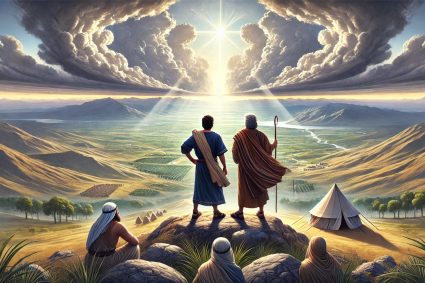
Series THE GOD OF LOVE AND JUSTICE with Pastor Mark Finley |
Lesson 2.Covenant Love |
Covenant Love – God’s Eternal Faithfulness and Our Response |
Lesson 2 addresses the infinite and faithful love of God that He extends to His covenant people. This love is not only a gift but also an invitation to an intimate relationship with Him. Through the concept of chesed love, it becomes clear that God’s mercy and goodness are not conditional, though the full enjoyment of the blessings of this relationship is. The lesson reminds us that God loved us first and that our love for Him and our neighbors is a response to this love. It invites us to consciously experience God’s love and reflect it through obedience and love for others.
Memory Text: John 14:23 – “Jesus answered and said to him, ‘If anyone loves Me, he will keep My word; and My Father will love him, and We will come to him and make Our home with him’. ”
Content:
2.1 The Everlasting Love of God
God’s Infinite Love – An Invitation to Salvation
God’s eternal love is unmistakably revealed in the Bible: God loves everyone, regardless of their condition or past. John 3:16 and other verses like Jeremiah 31:3 emphasize that this love is everlasting and all-encompassing. God desires that all people be saved, yet He does not force His love upon anyone. This love, which also extends to “detestable” persons, challenges us to practice love and compassion ourselves. When we experience God’s love in our lives, it changes our attitude toward others and empowers us to love even those who seem unlovable. God’s love remains a model for our actions—unconditional, relentless, and saving.
2.2 Covenant Love
Covenant Love – God’s Faithfulness and Our Response
God’s covenant love is described in the Bible by the Hebrew word chesed, which represents God’s unwavering goodness, mercy, and love in a faithful relationship. This love is boundless and steadfast, yet the full blessing of the relationship depends on His people’s willingness to follow Him and reciprocate this love. Deuteronomy 7:6–9 shows that God’s love is unconditional, while the covenant relationship requires mutual faithfulness. The pinnacle of God’s chesed is visible in Jesus Christ, who gave Himself on the cross. This love invites us to consciously experience it daily and respond by loving God and one another with faithfulness and gratitude.
2.3 Conditional Relationship
God’s Love and Our Response – Conditional Blessings, Unconditional Love
The relationship with God is characterized by His unconditional love, but the benefits of this relationship depend on our free choice to accept this love. If we fail to respond to God’s love, we can sever ourselves from the blessings of His presence and the promise of eternal life, even though His love never ceases. Texts like Hosea 9:15 and John 14:21 show that maintaining the blessings of this relationship requires obedience and faithfulness. God’s love remains like the sun that continuously shines, but we can cast ourselves into the shadows. Nature, even after the fall, reflects God’s love and invites us to experience and respond to this reality daily.
2.4 Mercy Forfeited
Conditional Grace – The Responsibility of Forgiveness
God’s love is eternal and unmerited, yet we have the choice to accept or reject it. The parable of the unforgiving servant shows that, like the servant, we owe a debt to God that we could never repay, yet He forgives us out of His boundless grace. This forgiveness requires us to extend it to others. The servant forfeited his master’s grace because he was not willing to forgive others. Similarly, rejecting to reflect God’s love can lead us to cut ourselves off from the blessings of His grace. The depth of the forgiveness we have received should move us to show mercy to others.
2.5 You Have Freely Received; Freely Give
Passing On Received Love – The Call to Neighborly Love
God’s love is a gift that we neither deserve nor can repay, yet we are called to pass it on. The Bible teaches that true love for God is shown in our love for others (John 15:12; 1 John 4:7–12). Those who have received mercy are called to act mercifully themselves. The parable of the unforgiving servant reminds us that extending forgiveness is a sign of true discipleship. Jesus’ command to love others as He has loved us calls us to make God’s love visible both in words and actions. Through this lived-out love, we can lead others to hope for eternal life.
2.6 Summary
Covenant Love – God’s Faithful Devotion and Our Response
Lesson 2 illuminates God’s unwavering and eternal love shown in a special covenant relationship with His people. This love is unmerited but remains steadfast, even when often rejected by us humans. God’s chesed—His faithful goodness—invites us to accept this love and respond through obedience and love for Him and others. Although we can never repay His love, we are called to pass it on by living out forgiveness and mercy. This lesson reminds us that God’s love is the foundation of our relationship with Him and that our love for others should be a visible sign of our discipleship.
Visited 57 times, 1 visit(s) today






